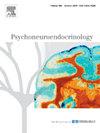Inflammation proteomic profiling of psychosis in young adults: Findings from the ALSPAC birth cohort
IF 3.4
2区 医学
Q2 ENDOCRINOLOGY & METABOLISM
引用次数: 0
Abstract
Psychotic disorder is associated with altered levels of various inflammatory markers in blood, but existing studies have typically focused on a few selected biomarkers, have not examined specific symptom domains notably negative symptoms, and are based on individuals with established/chronic illness. Based on data from young people aged 24 years from the Avon Longitudinal Study of Parents and Children (ALSPAC), a UK birth cohort, we have examined the associations of 67 plasma immune/inflammatory proteins assayed using the Olink Target 96 Inflammation panel with psychotic disorder, positive (any psychotic experiences and definite psychotic experiences) and negative symptoms, using linear models with empirical Bayes estimation. The analyses included between 2317 and 2854 individuals. After adjustment for age, sex, body mass index and smoking and correction for multiple testing, positive symptoms and psychotic disorder were consistently associated with upregulation of CDCP1 and IL-6, and psychotic disorder was additionally associated with upregulation of MMP-10. Negative symptoms were associated with upregulation of CDCP1 and TRAIL. CDCP1 and MMP-10 are novel markers of psychosis identified in this study, and are involved in immune regulation, immune cell activation/migration, blood-brain barrier disruption, and extracellular matrix abnormalities. Our findings highlight psychosis symptom domains have overlapping and distinct immune associations, and support a role of inflammation and immune dysfunction in the pathogenesis of psychosis.
青壮年精神病的炎症蛋白质组分析:ALSPAC 出生队列的研究结果。
精神障碍与血液中各种炎症标志物水平的改变有关,但现有的研究通常只关注少数几个选定的生物标志物,没有研究特定的症状领域,尤其是阴性症状,而且研究对象都是已确诊/慢性疾病患者。基于英国出生队列 "雅芳父母与子女纵向研究"(ALSPAC)中 24 岁年轻人的数据,我们使用经验贝叶斯估计的线性模型,研究了使用 Olink Target 96 Inflammation 面板检测的 67 种血浆免疫/炎症蛋白与精神病性障碍、阳性症状(任何精神病性经历和明确的精神病性经历)和阴性症状之间的关联。分析对象包括 2317 至 2854 人。在对年龄、性别、体重指数和吸烟进行调整并对多重检验进行校正后,阳性症状和精神病性障碍始终与 CDCP1 和 IL-6 的上调有关,精神病性障碍还与 MMP-10 的上调有关。阴性症状与 CDCP1 和 TRAIL 的上调有关。CDCP1 和 MMP-10 是本研究发现的新型精神病标志物,它们参与免疫调节、免疫细胞活化/迁移、血脑屏障破坏和细胞外基质异常。我们的研究结果表明,精神病症状域与免疫有重叠和不同的关联,并支持炎症和免疫功能紊乱在精神病发病机制中的作用。
本文章由计算机程序翻译,如有差异,请以英文原文为准。
求助全文
约1分钟内获得全文
求助全文
来源期刊

Psychoneuroendocrinology
医学-精神病学
CiteScore
7.40
自引率
8.10%
发文量
268
审稿时长
66 days
期刊介绍:
Psychoneuroendocrinology publishes papers dealing with the interrelated disciplines of psychology, neurobiology, endocrinology, immunology, neurology, and psychiatry, with an emphasis on multidisciplinary studies aiming at integrating these disciplines in terms of either basic research or clinical implications. One of the main goals is to understand how a variety of psychobiological factors interact in the expression of the stress response as it relates to the development and/or maintenance of neuropsychiatric illnesses.
 求助内容:
求助内容: 应助结果提醒方式:
应助结果提醒方式:


